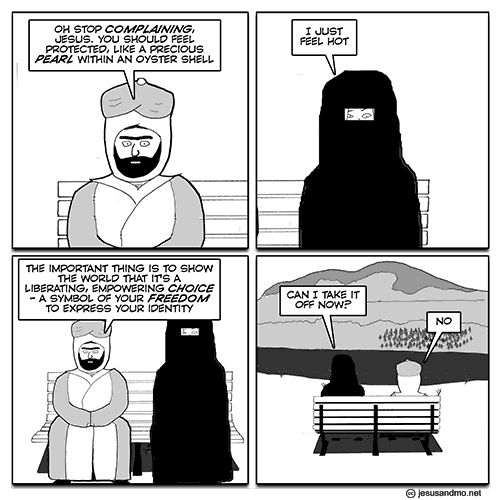What’s all this feminism nonsense? Didn’t we figure out a long time ago that that’s just politically correct bullshit? Janet Kornblum is there.
So when I heard about this whole bro-haha this weekend over some presentations at TechCrunch that a bunch of people thought were sexist, I was like, why the heck does everyone have their panties in a bunch?
What was behind all this hullabaloo? “Titstare” was, for one—that is, bros taking pictures of themselves staring at tits. Also “CircleShake,” an app that measures how hard someone can shake a phone and like, required dudes to stand up and simulate as if they were, well, you know.
And then Business Insider fires its Chief Technology Officer for a few measly “offensive” tweets, such as, “feminism in tech remains the champion topic for my block list. my finger is getting tired.”
Really, so what, ladies? These dudes are just being bros, having a little fun. I’m like totally sick of girls getting on their high horses about stuff like this. Seriously. Bros wanna have a little fun and make money. BFD, right? You gotta laugh with them.
Right? Feminists just drain all the fun out of life.
Dudes need their bromance. Bros gotta be bros.
Girls complaining about it? Total buzzkill. You don’t go to a frat house and bitch about the beer. You shouldn’t go to a start-up and meow about bro-workers.
It’s totally pointless and destructive, ladies!
Sure, it’s all PC to make sure you “diversify,” but start-ups have to Start Up. Get it? They can’t be held captive to a bunch of old school, outdated, personnel shit about who they have to hire. They have to be fast. They have to be fluid. They gotta be able to hire the best man for the job—even if sometimes, it’s a girl.
They need brogrammers who get it. Not sisgrammers. See? That doesn’t even work.
But the thing is? In real life, I’m one of those. One of those feminists. And by feminist, I mean a woman who stands up for women.
No that’s not what you’re supposed to do! You’re supposed to just put your head down and GET ON WITH YOUR WORK without always talking about women.
When I covered start-ups starting back in 1996, I remember being shocked by the blatant sexism. No, I’m not talking about everyone—but definitely, definitively most. It was clear that this was a man’s world. Women could come, but only if they followed dude rules. It was only cool if you could roll with the bros.
It was the beginning of the dot-com boom and I thought, well, it’s a new industry born of the male-dominated tech world. It’ll change.
Now it’s 16 years later, and guess what? The boys-only sign on the clubhouse has been switched out—to bros-only. The bro culture is hard-wired into many, many start-ups. I’m obviously not talking about everyone. But the fact that guys could stand up in a room and simulate masturbation and talk about tits at a major industry conference sure says something.
These events are not random. This kind of stuff and a lot worse happens all the time behind closed doors. The fact that they played out in public? It’s a sign of the times: that entitled, frat bro-culture has become not just tolerable in many circles, but even acceptable. Even kind of “fun.”
More than kind of, where I see it. Absolutely fun, unquestionably fun, enough fun to spend hours a day doing it on Twitter and forums (ok fora, but nobody says that and Word Press corrects it to for a). For some people it’s a party that goes on all day every day.
Naming a problem is the beginning. I’ve talked with a lot of women in the tech world about this; almost universally they can tell me stories about feeling excluded in all kinds of ways that maybe men don’t even notice: gatherings where only guys are invited; CEO’s using language like “brogramming”; and mostly, being passed up for promotions or being shut down. If they call out the behavior they’re told they’re “too sensitive.” But of course, they don’t want to complain out loud. Because guess what happens? They get shunned. Or they get fired. Both.
Elsewhere they get smeared, cyberstalked, photoshopped, cyberbullied.
“Boys will be boys” is fine when you’re alone in your own homes. But bros? The next time you want to hire a brogrammer or ask your coworker out for a browski, please think again about what you’re saying. It may seem harmless. But it isn’t. It sends a message.
Let’s hope that the next time a CEO hires, he’ll look beyond his own personal network. Maybe he’ll open one of those binders of women. Maybe it’ll happen two or three times. And maybe when there are just about an equal number of women, those women will feel comfortable and accepted enough to tell the guys when they’re doing something that they don’t know is sexist, but really is.
Let’s do this.
(This is a syndicated post. Read the original at FreeThoughtBlogs.)



